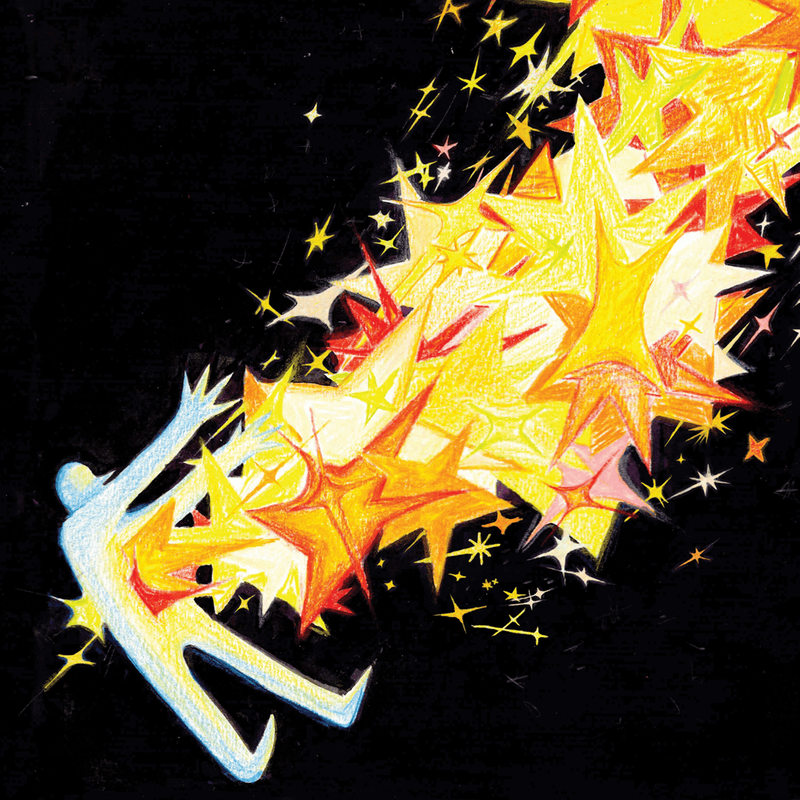A Pitchfork review described Japanese Breakfast as “a buffet of sub-genres.” No, Pitchfork is not some foodie blog giving a rather succinct analysis of a typical Japanese breakfast. Pitchfork is a prominent music publication known for its often polarizing, and arguably pretentious, album reviews. However, they could not have been more accurate with this quote.
Japanese Breakfast, an Oregonian band headed by Michelle Zauner, made its debut in 2013. Being a rather “cult favorite” band before 2021, Japanese Breakfast’s trajectory is the perfect case study for musical and personal growth. I say before 2021 because this was a pivotal year for both the band and Zauner, as the band released their hit album Jubilee and Zauner released New York Times Best Selling book Crying in H Mart. A memoir recalling and reminiscing on her relationship with her late mother, Zauner gave a lot of insight into the themes explored throughout the band’s tenure, especially their early work.
Their debut album, Psychopomp, can be described by one word: raw. As reductionist and contradictory as it might sound, Japanese Breakfast’s sound was far from refined in their days as musical youths. Still, the essence of this record comes from the pure emotion that is ingrained in every track. Being a collection of both remastered tracks from earlier projects and new ventures, Psychopomp explores themes of grief and lust. Coming only two years after not only the marriage of Zauner with bandmate Peter Bradley, but the passing of Zauner’s mother, Psychopomp is an album that lived in the moment, being the product of raw, but mixed emotion. Tracks like “In Heaven” and “Jane Cum” explore the disorientation that comes with grief, namely the passing of Zauner’s mother. Conversely, tracks like “Everybody Wants to Love You” and “Triple 7” introduce not only the theme of young love but also the unfailing disparity of it.
A bit more than a year later, the band released their sophomore album, Soft Sounds From Another Planet. Although I believe that Psychopomp is a great album, Soft Sounds From Another Planet is undoubtedly a more cohesive record thematically. Drawing from the theme of young love explored in their debut, the band instead focuses on fading love and the feeling of inadequacy that often accompanies it.
Starting with the track “Diving Woman,” which is the band’s go-to outro in concert, the lyrics allude to Zauner’s desire for comfortability in a relationship, being guided by distortion-heavy guitar. The middle of this record is quite strong, namely the three-track run of the title track “Soft Sounds From Another Planet,” “Boyish,” and “12 Steps,” all of which focus on deteriorating love through a lens of self-awareness. Near the end of the record is the song “Till Death,” my personal favorite and what I think should have been the outro. The track slowly evolves, starting with isolated vocals that evolve into a complete, and rather triumphant song, piece-by-piece. Exploring the uncertainty and utter worry that comes with a one-sided relationship, Zauner delineates her fears and need for support, writing “Your embrace healing my wounds. Teach me to breathe, teach me to move. PTSD, anxiety. Genetic disease, thanatophobia.”
Coming more than 4 years after the release of Soft Sounds From Another Planet, Japanese Breakfast released their critically acclaimed album Jubilee. Just to preface, this mini-review might sound a bit biased because it is. Jubilee has become one of my favorite albums and is the main reason I am writing this article. Japanese Breakfast is a rather young band, but this record sounds like a complete culmination of musical skill, building on every facet of their previous releases.
The thing that makes Jubilee stand out is its plasticity. The record seems like it is meant to show off the band’s range, especially regarding production and lyricism. Starting with “Paprika,” Zauner shows off her writing skills and conveys what seems like a novel emotion for the band: joy. Acknowledging the attention the band has gotten, Zauner writes “Projecting your visions to strangers who feel it, who listen to linger on every word. Oh it’s a rush.”
Immediately following this track is “Be Sweet,” a song that I will go out and say is the band’s most replayable and accessible. Derived straight from the 80s, this upbeat song features heavy synth, along with one of Zauner’s most catchy choruses. Hitting you with an emotional combo, “Kokomo, IN” follows up “Be Sweet” with a slow, string-heavy ballad of yearning for a love that once was.
Going through this album is like going through a rollercoaster of emotions. ‘Slide Tackle” takes you on a similar journey as “Be Sweet,” this time featuring jubilant 😉 horns along with a funky bass line. “Sit” is arguably the band’s most focused shoegaze track, featuring the trademark “fuzzy” guitar and airy vocals. “Savage Good Boy” finds the comfort that “Diving Woman” was searching for, taking it to the point that the narrator, presumably Zauner, is ready to devote their life to their partner.
To close out the album, the band brings out the big guns. “Posing for Cars,” a title that Zauner and her husband and fellow bandmate Peter Bradley came up with after a psychedelic mushroom trip, is the perfect example of catharsis in music. A track that I will go out and say is the band’s best, explores the issue of emotional disconnect in a relationship. The first half of the track contains lines like “And how could you ever conceive. How much I need you, how truly barren I can be?” and “And how could you ever conceive. This adolescent heart skipping beats?” Zauner builds an outline of near-sarcasm brought about by this disconnect. Using this outline, Zauner paints a picture, this time with her guitar. For nearly 4 minutes, Zauner embarks on one of the most powerful guitar solos I have ever heard, illustrating the conflict that comes from the disconnect described above. The slow guitar beginning just after the lyrics eventually grows into unintelligible chaos, followed by echoing silence. Combining themes and inspiration from not only Japanese Breakfast’s previous releases but Zauner’s tenure in the punk band Little Big League’s, “Posing for Cars,” is the essence of all that Japanese Breakfast has built itself up to be.
Japanese Breakfast hasn’t released a major project since Jubilee, instead taking the time to tour and soak in the success that Jubilee brought. Thankfully, I was able to reap the benefits of this and see Japanese Breakfast in Portland this summer. To say that they were amazing in concert would be an understatement—the band’s stage presence along with the musical ensemble they brought made for an absolute mind-melting performance. Since then, I feel like I have become a J Brekkie enthusiast, with releases from their full tenure as a band constantly in rotation.
Safe to say I am a fan.




















A.C • Feb 6, 2024 at 2:04 PM
Great read! Definitely going to indulge in this Album!